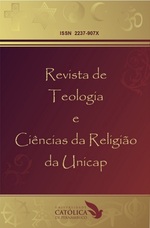ANTHROPOLOGICAL CHANGES IN THE CONTEMPORARY WORLD AND THE IMPACT ON THE EVOLUTION OF TOMORROW'S CHURCH
DOI:
https://doi.org/10.25247/paralellus.2024.v15n37.p449-468Keywords:
Anthropology, Anthropological paradigms, Church, Co-evolution, Culture, Nature, Nicaea, TechnologiesAbstract
Anthropological changes in the contemporary world and the impact on the evolution of the Church of tomorrow. The Council of Nicaea marks the transition from the Church of the beginnings, forbidden, in the process of organizing ecclesial structures according to the specifics of Christianity, towards an institutional Church, as a dialogue partner with the other social institutions, in the game of power specific to the geopolitics world. This first establishment of the landmarks of unity and dialogue on the path of synodality is the model that has proven its validity throughout the history of the Church. The historical church has known the schisms generated by Arianism, the anathema schism of 1054, the schisms that generate the disintegration of unity in the wake of the Reformation, and the Christianity passes from an illicit religion to an official religion, from a religion of the European-Mediterranean cultural environment to a missionary religion that reaches all continents. It begins by inculturating the values of the Gospel in a pagan world, it knows the dominant position within European civilization, to retreat in the face of secularization and the gradual desacralization of culture. At the present time we are on the threshold of changing anthropological paradigms. The co-evolution of man-nature, man-culture and man-technologies of the digitized world has consequences on the individual and on society, situating the spirituality in a new context and in new forms of cultural manifestation. The ecclesial structures will adapt by virtue of the plasticity, the ability to adapt to the new that it has shown since Antiquity, going through the medieval, modern and contemporary era. The model of unity in diversity and of the synodality initiated at the first Ecumenical Council in Nicaea remains the only pattern through which the Christian Church will manifest its catholicity and missionary-ecumenical function in the world of tomorrow.
Downloads
References
BARTA, Cristian. Tradiție și dogmă, Editura Buna Vestire, Blaj, 2003.
BUZALIC, Alexandru. Anthropos. Paradigmele unui model antropologic integral, Galaxia Gutenberg, 2022.
BUZALIC, Alexandru. Crepusculul civilizațiilor. Metaanaliza spiritualității tranzițiilor culturale, Presa Universitară Clujeană, Cluj-Napoca, 2017.
BUZALIC, Alexandru. Migrație și religie, Presa Universitară Clujeană, Cluj-Napoca, 2016.
Catechismo della Chiesa Cattolica, n. 84.
CONGAR, Yves. Chrétiens désunis: Principes d'un 'oecuménisme' catholique, Les Editions du Cerf, 1937.
DAGRON, Gilbert. Empereur et prêtre. Étude sur le „césaropapisme” byzantin, Ed. Gallimard, Paris 1996.
DELUMEAU, Jean. Le Christianisme va t il mourir?, Hachette, Paris 1977.
ELIADE, Mircea. Nostalgia originilor. Istorie și semnificație în religie, Humanitas, București 2013.
Ionuț Mihai POPESCU, Secularizarea și afirmarea individualismului, Logos’94, Oradea, 2019.
La formazione teologica dei futuri sacerdoti, Santa Sede, Sacra congregazione per l'educazione cattolica, Roma, 1976, n. 109.
Laudato si, n. 141.
MARGA, Andrei. Pragmatismul reflexiv. Încercare de construcție filosofică, Editura Compania, București 2016.
MARGA, Andrei. Religia în era globalizării, Editura Fundației pentru Studii Europene, Cluj 2003.
Mircea Eliade et la Redécouverte du Sacré, documentario di Paul Barba Negra, France Régions 3, Cluny Télé Films, 1987.
Momento straordinario di preghiera in tempo di epidemia presieduto dal Santo Padre Francesco, sagrato della Basilica di San Pietro, venerdì 27 marzo 2020, https://www.vatican.va/news_services/liturgy/2020/documents/ns_lit_doc_20200327_preghiera_it.html.
Papa Francesco, La vita dopo la pandemia, Prefazione del card. Michael Czerny, Libreria Editrice Vaticana, Città del Vaticano 2020.
PICQ, Pascal. Sapiens face à sapiens. La splendide et tragique histoire de l’humanité, Flammarion, Paris 2019.
PRUNDUŞ, Silvestru Augustin; PLĂIANU, Clemente. Catolicism și ortodoxie românească. Scurt istoric al Bisericii Române Unite, Casa de Editură Viața Creștină, Cluj-Napoca, 1994.
RAHNER, Karl. Corso fondamentale sulla fede. Introduzione al concetto di cristianesimo, San Paolo Edizioni, Milano 2005.
RAHNER, Karl. Dio e Rivelazione, Nuovi saggi VII, Edizioni Paoline, Roma 1981.
REMBIERZ, Marek. Między współczesnym „społeczeństwem wyboru” a tradycyjnym „społeczeństwem losu”. O refleksyjnym i ustawicznym uczeniu się pluralizmu według Janusza Mariańskiego, in: Janusz Mariański, ”Pluralizm społeczno–kulturowy jako megatrend a religijność i moralność - studium socjologiczne, Wyższa Szkoła Nauk Społecznych z siedzibą w Lublinie”, Lublin 2022.
RIES, Julien. L'uomo religioso e la sua esperienza del sacro, Jaca Book, Milano 2007.
TILLARD, J.-M. R.. Église d'églises. L'ecclésiologie de communion , CERF, Paris1987.
WIEDENHOFER, Siegfried. Ekklesiologie, in: Handbuch der Dogmatik, tom. II, Patmos Verlag, Düsseldorf, 1992.
Downloads
Published
Issue
Section
License
Copyright (c) 2024 Alexandru Buzalic

This work is licensed under a Creative Commons Attribution 4.0 International License.
A submissão de originais para a Paralellus implica a transferência, pelos autores, dos direitos de publicação eletrônica. Os direitos autorais para os artigos veiculados neste periódico são do autor; todavia, são da revista os direitos sobre a primeira publicação. Os autores somente poderão fazer uso dos mesmos resultados em outras publicações se indicarem, claramente, que a Paralellus foi o meio originalmente utilizado. Em decorrência do fato de ser a Paralellus uma revista de acesso público, é permitida a utilização gratuita dos artigos em aplicações educacionais e/ou científicas não comerciais, desde que respeitando-se a exigência de citação da fonte (Texto atualizado em 16-11-2020).
















